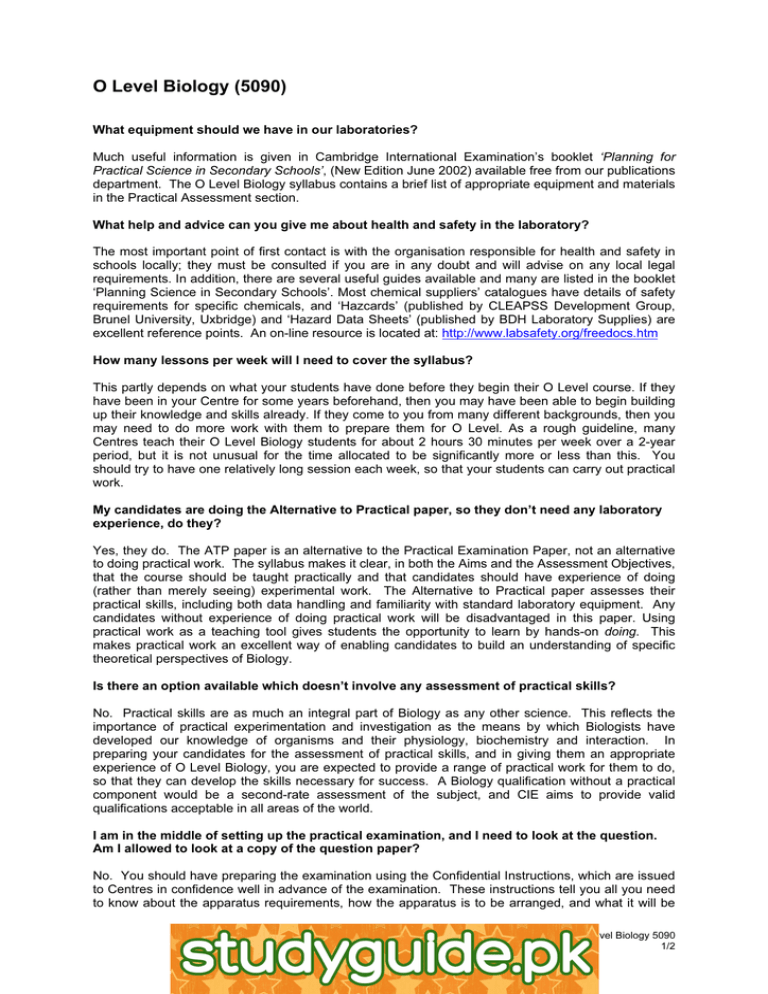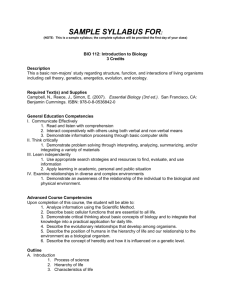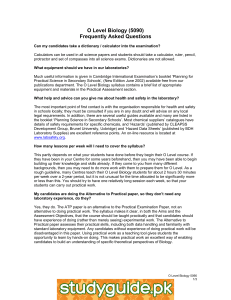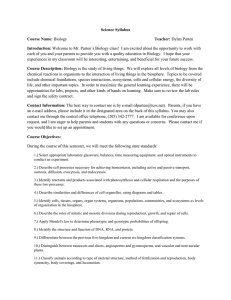O Level Biology (5090)
advertisement

O Level Biology (5090) What equipment should we have in our laboratories? Much useful information is given in Cambridge International Examination’s booklet ‘Planning for Practical Science in Secondary Schools’, (New Edition June 2002) available free from our publications department. The O Level Biology syllabus contains a brief list of appropriate equipment and materials in the Practical Assessment section. What help and advice can you give me about health and safety in the laboratory? The most important point of first contact is with the organisation responsible for health and safety in schools locally; they must be consulted if you are in any doubt and will advise on any local legal requirements. In addition, there are several useful guides available and many are listed in the booklet ‘Planning Science in Secondary Schools’. Most chemical suppliers’ catalogues have details of safety requirements for specific chemicals, and ‘Hazcards’ (published by CLEAPSS Development Group, Brunel University, Uxbridge) and ‘Hazard Data Sheets’ (published by BDH Laboratory Supplies) are excellent reference points. An on-line resource is located at: http://www.labsafety.org/freedocs.htm How many lessons per week will I need to cover the syllabus? This partly depends on what your students have done before they begin their O Level course. If they have been in your Centre for some years beforehand, then you may have been able to begin building up their knowledge and skills already. If they come to you from many different backgrounds, then you may need to do more work with them to prepare them for O Level. As a rough guideline, many Centres teach their O Level Biology students for about 2 hours 30 minutes per week over a 2-year period, but it is not unusual for the time allocated to be significantly more or less than this. You should try to have one relatively long session each week, so that your students can carry out practical work. My candidates are doing the Alternative to Practical paper, so they don’t need any laboratory experience, do they? Yes, they do. The ATP paper is an alternative to the Practical Examination Paper, not an alternative to doing practical work. The syllabus makes it clear, in both the Aims and the Assessment Objectives, that the course should be taught practically and that candidates should have experience of doing (rather than merely seeing) experimental work. The Alternative to Practical paper assesses their practical skills, including both data handling and familiarity with standard laboratory equipment. Any candidates without experience of doing practical work will be disadvantaged in this paper. Using practical work as a teaching tool gives students the opportunity to learn by hands-on doing. This makes practical work an excellent way of enabling candidates to build an understanding of specific theoretical perspectives of Biology. Is there an option available which doesn’t involve any assessment of practical skills? No. Practical skills are as much an integral part of Biology as any other science. This reflects the importance of practical experimentation and investigation as the means by which Biologists have developed our knowledge of organisms and their physiology, biochemistry and interaction. In preparing your candidates for the assessment of practical skills, and in giving them an appropriate experience of O Level Biology, you are expected to provide a range of practical work for them to do, so that they can develop the skills necessary for success. A Biology qualification without a practical component would be a second-rate assessment of the subject, and CIE aims to provide valid qualifications acceptable in all areas of the world. I am in the middle of setting up the practical examination, and I need to look at the question. Am I allowed to look at a copy of the question paper? No. You should have preparing the examination using the Confidential Instructions, which are issued to Centres in confidence well in advance of the examination. These instructions tell you all you need to know about the apparatus requirements, how the apparatus is to be arranged, and what it will be http://www.xtremepapers.net O Level Biology 5090 1/2 used for. If you have a problem which cannot be resolved using the Confidential Instructions, please telephone our Customer services line on +44 1223 553554 or e-mail International@ucles.org.uk. I cannot get the exact equipment or specimens specified in the Confidential Instructions, but I can obtain something similar. Am I allowed to adapt the experiment at all? Yes, you are allowed to make minor adaptations to the apparatus and specimens required, providing that everything still works as specified in the Confidential Instructions. You do not need to seek our approval for these minor adaptations, although you may prefer to check that all is well by doing so. In any case, you must report the adaptations in detail to the examiners, by completing the Supervisor’s Report form on the back of the Confidential Instructions, which should be enclosed with the candidates’ completed scripts. More substantial adaptations, which require changes to the experiment or which cause the apparatus to work in a different way from that described in the Confidential Instructions, are not allowed unless you have obtained prior approval from CIE. Which option makes it easiest for my students to achieve high grades? All the options have the same level of difficulty, and in every examination we use robust statistical methods to ensure this. Which is the correct textbook for the course? We don’t require Centres to use any one particular textbook for our courses, and we would hope that wherever possible teachers would make use of a variety of different resources. It is good practice for students to get into the habit of using more than one book, and this also has the advantage that if they do not understand an explanation in one book, they may find a different explanation more helpful to them. We do provide a list of books in the syllabus that we believe teachers may find helpful, some of which are written specifically to cover the O Level syllabus. You can also can find this on our website at http://www.cie.org.uk. (You will need to click on ‘Qualifications and Awards’, ‘O Level’ button and ‘Biology’ then follow the instructions to locate the resource list.) Do I need to teach the course in the order given in the syllabus? No, the order in which you teach the course is entirely up to you. The curriculum content within the syllabus outlines the facts and concepts that will be assessed in the examination, but teachers are expected to construct and follow their own scheme of work based on the curriculum content. The information about the terminology and units given towards the back of the syllabus is helpful, but where can I find out more? The Institute of Biology publishes an excellent booklet entitled Biological Nomenclature - Standard terms and expressions used in the teaching of Biology. This is now in its third edition. Cambridge International Examinations follow the recommendations in this booklet when setting examination papers. You will find it an essential reference, containing guidance on best practice in recording results and graph construction, advice on how to represent genetic crosses etc. It can be obtained directly from the Institute of Biology, 20 Queensberry Place, London, SW7 2DZ, England. Alternatively, you can order a copy from the Institute of Biology's web site at http:// www.iob.org . Where is the glossary that used to be at the end of the printed syllabus? To avoid duplication this is now after all of the Biological Sciences syllabuses, at the end of the 5038 Agriculture syllabus in the syllabus booklet. Where can I get advice from fellow teachers? There is a teacher discussion group for teachers, hosted by the product manager at CIE and a senior examiner. To subscribe or unsubscribe via the World Wide Web, visit http://lists.ucles.org.uk/lists/listinfo/cie-biology or, via email, send a message with subject or body 'help' to cie-biology-request@lists.ucles.org.uk O Level Biology 5090 2/2








